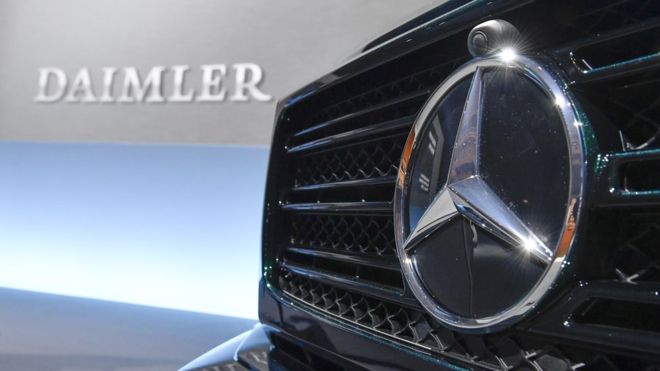It is hard for banks to make money when yields on the safest of government bonds,
當(dāng)最安全的政府債券收益率達(dá)到一定水平時(shí),銀行很難盈利,
the benchmark for lending rates, are negative, as they are in Europe.
和在歐洲一樣,貸款利率的基準(zhǔn)為負(fù)。
Banks face an additional threat from financial technology firms,
銀行還面臨著來(lái)自金融科技公司的威脅,
which do not share their burden of costly branches or surplus staff.
這些公司不分擔(dān)他們費(fèi)錢的分支機(jī)構(gòu)或過(guò)剩員工的負(fù)擔(dān)。
Carmakers need pots of capital to equip them to make electric and self-driving cars. The returns are far from certain.
汽車制造商需要大量資金來(lái)裝備自己,生產(chǎn)電動(dòng)汽車和自動(dòng)駕駛汽車。回報(bào)遠(yuǎn)不能確定。
It is easy to imagine a future in which status is less entwined with car ownership.
不難想象,在未來(lái),社會(huì)地位與汽車擁有權(quán)之間的聯(lián)系將會(huì)減少。
People may not care whether the robotaxi they fleetingly occupy is a luxury car or a bog-standard saloon.
人們可能并不在乎他們乘坐的機(jī)器人出租車是豪車還是普通轎車。
Before then, the prospect of punitive American tariffs on European-made cars is looming.
在此之前,美國(guó)對(duì)歐洲制造的汽車征收懲罰性關(guān)稅的前景迫在眉睫。
The value-growth axis is different in Europe, because there are no homegrown tech giants.
在歐洲,價(jià)值增長(zhǎng)的軸線是不同的,因?yàn)闅W洲沒(méi)有本土科技巨頭。
The big stockmarket winners have been quality stocks.
股市的大贏家一直是優(yōu)質(zhì)股。
This is a category that combines stable profits and high return on capital with sensible debts and low staff turnover.
這個(gè)類別是利潤(rùn)穩(wěn)定、資本回報(bào)率高和債務(wù)合理以及員工流動(dòng)率低的結(jié)合。

Many are consumer firms with strong brands, such as Nestlé, Diageo (a British drinks giant) and LVMH (a French luxury-goods firm).
許多都是擁有強(qiáng)大品牌的消費(fèi)品公司,如雀巢、迪阿吉奧(英國(guó)飲料巨頭)以及路易威登(法國(guó)奢侈品公司)。
Value investors, however chastened, believe there is an opportunity here.
價(jià)值型投資者雖然受到了抑制,但他們相信仍有機(jī)會(huì)。
For them, the Daimler-type stock is the one to buy. True, carmakers (and banks) have their troubles. But value stocks usually do.
對(duì)他們而言,戴姆勒型的股票是值得購(gòu)買的。沒(méi)錯(cuò),汽車制造商(以及銀行)也有自己的困難。但價(jià)值型股票通常如此。
The trick is to buy them when everyone shuns them, because that is when they are cheap.
訣竅在于,當(dāng)所有人都在回避它們時(shí),你就去買它們,因?yàn)檫@個(gè)時(shí)候它們很便宜。
The Nestlé-type stock is the sort of fad that the giddier sort of investor piles into, only to rue overpaying as it falls back to earth.
雀巢型的股票是一種時(shí)尚,讓眼花繚亂的投資者蜂擁而至,但當(dāng)它跌落神壇,人們只后悔買價(jià)太高。
Well, perhaps. But why be a hero? An investor in a low-cost index fund can own both types of stock without worrying too much about relative value.
或許如此,但為什么要做英雄呢?低成本指數(shù)基金的投資者可以同時(shí)持有這兩種股票,而不必過(guò)多擔(dān)心相對(duì)價(jià)值。
A lot of stockpicking Americans stay away altogether. The cheap stocks look hopeless; the dear stocks look expensive.
很多選股的美國(guó)人兩種都不買。便宜的股票看起來(lái)沒(méi)啥希望,高價(jià)股票由太貴了。
So they don't buy at all, says Robert Buckland of Citigroup.
所以他們干脆不買股票,花旗銀行的羅伯特·伯克蘭說(shuō)到。
The Nestlé-Daimler breach mirrors the divide within property markets in cities such as London.
雀巢和戴姆勒的缺口反映了倫敦等城市中地產(chǎn)市場(chǎng)的分歧。
You could try to make a killing on a fixer-upper in a down-at-heel suburb. That bet requires patience and luck.
你可以試著在破舊郊區(qū)的一處需要修葺的住宅區(qū)大賺一筆。這個(gè)賭注需要耐心和運(yùn)氣。
Or you could buy a nice house in a ritzy neighbourhood. It will not be cheap. But it may never get much cheaper.
或者你也可以在奢華的街區(qū)買一幢漂亮的房子。價(jià)格不菲,但也可能永遠(yuǎn)不會(huì)大降價(jià)。
譯文由可可原創(chuàng),僅供學(xué)習(xí)交流使用,未經(jīng)許可請(qǐng)勿轉(zhuǎn)載。












